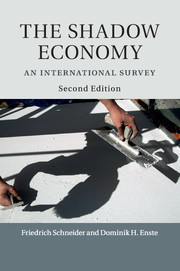Description
The Shadow Economy (2nd Ed.)
An International Survey
Authors: Schneider Friedrich, Enste Dominik H.
This book presents new data to give an overview of shadow economies from OECD countries and propose solutions to prevent illicit work.
Language: English
Subject for The Shadow Economy:
Approximative price 32.87 €
In Print (Delivery period: 14 days).
Add to cart
The Shadow Economy
Publication date: 04-2016
Support: Print on demand
Publication date: 04-2016
Support: Print on demand
Approximative price 100.60 €
In Print (Delivery period: 14 days).
Add to cart
The Shadow Economy: An International Survey (2nd Ed.)
Publication date: 02-2013
226 p. · 15.2x22.9 cm · Hardback
Publication date: 02-2013
226 p. · 15.2x22.9 cm · Hardback
Description
/li>Contents
/li>Biography
/li>
Illicit work, social security fraud, economic crime and other shadow economy activities are fast becoming an international problem. This second edition uses new data to reassess currency demand and the model approach to estimate the size of the shadow economy in 151 developing, transition, and OECD countries. This updated edition argues that during the 2000s the average size of the shadow economy varied from 19 per cent of GDP for OECD countries, to 30 per cent for transition countries, to 45 per cent for developing countries. It examines the causes and consequences of this development using an integrated approach to explain deviant behaviour that combines findings from economic, sociological, and psychological research. The authors suggest that increasing taxation and social security contributions, rising state regulatory activities, and the decline of the tax morale are all driving forces behind this growth, and they propose a reform of state public institutions in order to improve the dynamics of the official economy.
1. The shadow economy: a challenge for economic and social policy; 2. Defining the shadow economy; 3. Methods to estimate the size of the shadow economy; 4. Size of shadow economies around the world; 5. The size of the shadow economy labour force; 6. An integrated approach to explain deviant behaviour; 7. Analysing the causes and measures of economic policy; 8. Effects of the increasing shadow economy; 9. The 'two-pillar strategy'; 10. Conclusion and outlook.
Friedrich Schneider is Professor of Economics of the Johannes Kepler University of Linz, Austria. He was the European editor of Public Choice from 1991 to 2004 and he has published extensively in leading economic journals including The Quarterly Journal of Economics, The American Economic Review, The Economic Journal and Kyklos.
Dominik H. Enste is Head of the Department of Institutional and Behavioral Economics at the Cologne Institute for Economic Research. He is also Professor of Economics and Ethical and Behavioral Economics at the University of Applied Science and Lecturer at the University of Cologne. His main research focuses on institutional and ethical economics/business ethics and behavioral economics. He has published several books and articles, in publications such as The Journal of Economic Literature and Constitutional Political Economy.
Dominik H. Enste is Head of the Department of Institutional and Behavioral Economics at the Cologne Institute for Economic Research. He is also Professor of Economics and Ethical and Behavioral Economics at the University of Applied Science and Lecturer at the University of Cologne. His main research focuses on institutional and ethical economics/business ethics and behavioral economics. He has published several books and articles, in publications such as The Journal of Economic Literature and Constitutional Political Economy.
© 2024 LAVOISIER S.A.S.




